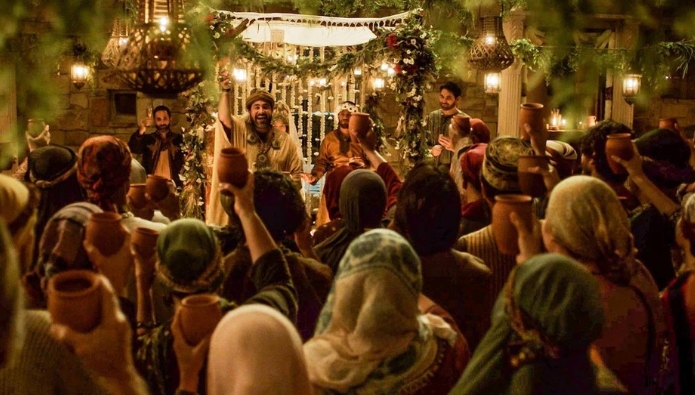In the rich tapestry of Jesus’ teachings, The Wedding Feast Parable, as depicted in Luke 14:7-14, offers a compelling exploration of humility, social justice, and the essence of true hospitality. Through the setting of a wedding banquet, Jesus presents a vivid illustration that challenges societal norms and invites us to reflect on our attitudes towards honor, privilege, and our responsibilities towards the marginalized. This parable not only addresses personal conduct in social situations but also extends into a broader theological message about the Kingdom of God and the values it upholds.
The Wedding Feast Parable is a multifaceted narrative that encourages us to examine the motivations behind our actions and the ways we interact with those around us. It questions the pursuit of self-aggrandizement and societal recognition, proposing instead a life marked by humility and selflessness. Additionally, by emphasizing the blessing of inviting those who cannot repay, Jesus introduces a radical ethic of generosity that prioritizes the well-being of the least fortunate over reciprocal social exchanges.
As we delve into The Wedding Feast Parable, we aim to unpack its layers, understanding how Jesus’ advice to choose the lowest place at a table is not just about literal seating arrangements but about a posture of humility and service in all aspects of life. This exploration will not only shed light on the cultural context of Jesus’ time but also offer timeless wisdom on how to navigate our own social landscapes with grace, compassion, and a heart aligned with the values of God’s Kingdom.
Join us as we journey through The Wedding Feast Parable, seeking to draw practical insights for our daily lives and to embody the profound teachings it imparts about humility, hospitality, and the transformative power of genuine kindness.
Also Read: Parable of Jesus: The Friend at Midnight
Parable of Jesus Christ: The Wedding Feast
The Wedding Feast Parable, Luke chapter 14, verses 7-14 (WEB):
“7 He told a parable to those who were invited, when he noticed how they chose the best seats, and said to them, 8 ‘When you are invited by anyone to a marriage feast, don’t sit in the best seat, since perhaps someone more honorable than you might be invited by him, 9 and he who invited both of you would come and tell you, ‘Give this man your seat,’ and then you would begin with shame to take the lowest place.
10 But when you are invited, go and sit in the lowest place, so that when he who invited you comes, he may tell you, ‘Friend, move up higher.’ Then you will be honored in the presence of all who sit at the table with you. 11 For everyone who exalts himself will be humbled, and whoever humbles himself will be exalted.’
12 He also said to the one who had invited him, ‘When you make a dinner or a supper, don’t call your friends, nor your brothers, nor your kinsmen, nor rich neighbors, or perhaps they might also return the favor, and pay you back. 13 But when you make a feast, call the poor, the maimed, the lame, the blind, 14 and you will be blessed, because they don’t have the resources to repay you. For you will be repaid in the resurrection of the righteous.'”
This parable, often referred to as the Parable of the Wedding Feast, teaches about humility, the importance of not seeking honor for oneself, and the blessings that come from extending generosity to those who cannot repay.
Also Read: The 45 Parables of Jesus
Interpretation of The Wedding Feast Parable

The Wedding Feast Parable, found in Luke 14:7-14, offers profound insights into humility, hospitality, and the nature of God’s kingdom, encapsulating Jesus’ radical teachings on social ethics and personal conduct. This narrative is not merely about social etiquette but reveals deeper spiritual truths about how we are to live in relation to others and before God.
The Lesson of Humility
Choosing the Lowest Place: At its core, The Wedding Feast Parable advises attendees of a banquet to choose the lowest seat rather than seeking places of honor. This recommendation transcends mere social strategy; it’s a metaphor for life, urging us to adopt humility as our stance in all relationships and circumstances. Jesus challenges societal norms that equate worth with social standing, emphasizing that true honor comes from God and is bestowed upon those who do not seek it for themselves.
Reversal of Social Values: Jesus’ advice subverts the social values of His time, where honor and status were aggressively pursued and fiercely protected. By suggesting that one voluntarily takes the lowest position, He introduces a new paradigm for understanding and practicing honor — one that is not claimed but conferred by others, ultimately reflecting the divine principle that “everyone who exalts himself will be humbled, and whoever humbles himself will be exalted.”
The Ethic of Generosity
Inviting the Least: The latter part of The Wedding Feast Parable shifts focus to the host’s responsibilities, advocating for an ethic of generosity that prioritizes the poor, the crippled, the lame, and the blind — those unable to reciprocate. This teaching challenges us to reconsider whom we extend our hospitality to and why, urging us to see acts of kindness and generosity not as means to social leverage but as ends in themselves.
Blessings Beyond Reciprocity: Jesus underscores that true blessings come not from social transactions that anticipate a return but from selfless giving to those who cannot repay. This principle reflects the heart of God’s grace, freely given to us without merit. The promise of being “repaid at the resurrection of the righteous” points to a future hope where God’s justice will prevail, rewarding acts of genuine love and compassion.
Implications for Personal Conduct and Social Justice
Modeling Kingdom Values: The Wedding Feast Parable calls Christians to model the values of God’s kingdom in their personal and social conduct. By living out the humility and generosity that Jesus teaches, believers bear witness to a different way of being in the world, one that challenges prevailing social hierarchies and offers a glimpse of the kingdom of God.
Advocating for the Marginalized: Beyond individual acts of kindness, the parable inspires a broader commitment to social justice, advocating for a society where the marginalized are given places of honor. This reflects Jesus’ broader ministry and message, emphasizing the value of every person in the eyes of God and the call to create communities that embody this inclusive, upside-down kingdom ethic.
The Wedding Feast Parable remains a powerful and challenging narrative that speaks directly to our contemporary issues of pride, privilege, and inequality. Through the simple yet radical acts of choosing humility and extending generosity beyond the bounds of reciprocity, we are invited to live out the transformative values of the kingdom of God. This parable not only calls us to personal reflection and change but also to actively participate in reshaping our world in accordance with the principles of love, justice, and humility that Jesus embodies.
Also read: Parable of Jesus: The Good Samaritan
Practical application of the Wedding Feast in Our Daily Lives

How can you apply the Wedding Feast Parable in practically in your daily life? Let’s find out.
The Wedding Feast Parable, rich in its teachings on humility and hospitality, offers valuable lessons that can profoundly impact our daily interactions and broader societal engagement. Here’s how we can integrate the timeless wisdom of The Wedding Feast Parable into the fabric of our lives.
Embracing Humility
Self-Reflection on Social Dynamics: Regularly examine your behavior in social settings. Are you seeking recognition or the ‘best seat’? Practice stepping back, allowing others to shine, and finding contentment in less prominent roles. This not only cultivates humility but also enriches your relationships by focusing on genuine connections over social status.
Valuing Others’ Contributions: In work and community life, make a conscious effort to acknowledge and elevate the contributions of those often overlooked. This practice not only mirrors the humility taught in The Wedding Feast Parable but also builds a culture of mutual respect and appreciation.
Practicing Inclusive Hospitality
Expanding Your Circle of Generosity: Challenge yourself to extend hospitality beyond your usual circle of friends and family. Organize gatherings, or participate in community services, that reach out to the marginalized, the lonely, and those in need, embodying the inclusive hospitality Jesus advocates for in The Wedding Feast Parable.
Volunteering and Charitable Giving: Actively seek opportunities to give your time and resources where they can make a difference without expecting anything in return. Volunteering at local shelters, donating to causes supporting the disadvantaged, or simply performing acts of kindness for strangers are practical ways to live out the parable’s call to bless those who cannot repay you.
Fostering Community and Generosity
Building Supportive Relationships: The Friend at Midnight Parable also highlights the importance of supportive relationships and community. We can strive to be the kind of friend who responds with generosity, even when it’s inconvenient, understanding the value of being there for one another in times of need.
Practicing Hospitality and Openness: Reflecting the hospitality shown in the parable, we are called to practice openness and generosity in our own lives. This could manifest in simple acts of kindness, offering our time and resources, or welcoming those who are in difficult situations with an open heart and helping hand.
Advocating for Social Justice
Promoting Equity and Inclusion: The Wedding Feast Parable’s emphasis on inviting the “poor, crippled, lame, and blind” serves as a metaphor for challenging social hierarchies and advocating for a more equitable society. Engage in or support initiatives that work towards social justice, equity, and inclusion, reflecting the kingdom values Jesus describes.
Supporting Policies that Aid the Marginalized: In the spirit of The Wedding Feast Parable, lend your voice to support policies and programs that aim to lift up the marginalized. Whether it’s through advocacy, informed voting, or public discourse, contribute to shaping a society where generosity and support for the least among us are foundational principles.
Fostering a Heart of Service
Living as Servants: Adopt a servant-leader mindset in your family, workplace, and community. Seek ways to serve others’ needs before your own, demonstrating the humility and selflessness at the core of The Wedding Feast Parable. This shift in perspective transforms everyday interactions and decisions, aligning them more closely with the teachings of Jesus.
Cultivating Gratitude and Contentment: Practice gratitude for the opportunities to serve and give, recognizing them as privileges rather than burdens. This mindset fosters a heart of contentment, joyfully participating in acts of service and hospitality without seeking personal gain.
The Wedding Feast Parable is not just a lesson for ancient banquet-goers but a call to action for everyone seeking to live a life reflective of Jesus’ teachings. By embracing humility, practicing inclusive hospitality, advocating for social justice, and fostering a heart of service, we can apply the profound lessons of The Wedding Feast Parable in our daily lives. Let this parable inspire us to transform our communities and our world, one act of kindness and humility at a time.
Conclusion

In wrapping up our exploration of The Wedding Feast Parable, we’ve traversed the depths of humility and the breadth of genuine hospitality, uncovering how these timeless teachings can illuminate our paths today. This parable, rich with Jesus’ wisdom, does more than guide us in social etiquette; it challenges us to embody a deeper, more profound way of living that reflects the heart of the Kingdom of God.
The Wedding Feast Parable calls us into a life marked by selflessness, where the pursuit of personal honor is replaced by the pursuit of serving others. It invites us to look beyond our circles, to extend our hands in generosity to those who can never repay us, mirroring the unconditional love that God shows each of us. This isn’t just about changing how we act at gatherings but about transforming our approach to daily life, seeing every interaction as an opportunity to practice the humility and hospitality that Jesus so vividly describes.
As we conclude this blog post, let The Wedding Feast Parable inspire us to live with open hearts and homes, making space at our tables and in our lives for the “poor, the crippled, the lame, the blind” — and in doing so, finding our lives enriched in ways we could never have anticipated. May we carry forward the spirit of this parable, allowing it to shape our actions, our relationships, and our communities in the image of the Kingdom of God. Through practical application of The Wedding Feast Parable, we have the opportunity to not only witness but also participate in the unfolding of God’s gracious and inclusive love in our world.
Read the Next: Parable of Jesus: The Great Banquet








